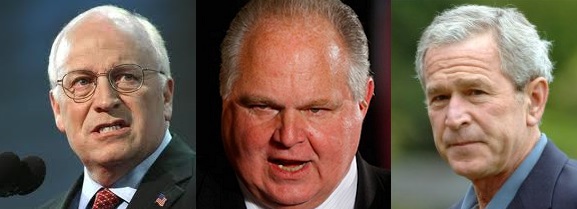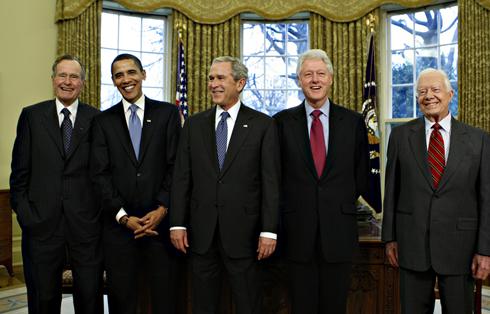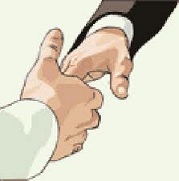but Destroyed the Bush Administration

Bulls Bears and the Ballot Box - Bob Deitrick & Lew Goldfarb
Blinded By Might
How conservatives blew it
[last save 9/13/11]
Hosted free by tripod.com
but Destroyed the Bush Administration

Bulls Bears and the Ballot Box - Bob Deitrick & Lew Goldfarb
2012 Deja Vu all over again?
Cal Thomas wrote a book chiding the Christian Right, titling his reprimand "Blinded by might"
(In politics, blindness can be fatal to future election success.)
This time around, the left-leaning Cindy Sheehan was blinded by something else, personal pain perhaps. Or the ravages of grief still raw. (By early 2008, the Democrats, by and large, were taken over by a general attitude toward Iraq of get-out-this-second, following the lead of Cindy Sheehan and others)Where Republicans went wrong - the "most socialist" deficit record in U.S. historyIn February, 2007, when Barack Obama declared that he was running for President, violence in Iraq had reached apocalyptic levels, and he based his candidacy, in part, on a bold promise to begin a rapid withdrawal of American forces upon taking office. At the time, this pledge represented conventional thinking among Democrats and was guaranteed to play well with primary voters.
During the early primaries, Senator Obama continually pointed out that he was the only Democrat who NEVER supported the war, or supported funding for the troops.
But in the year and a half since Obama entered the primaries, two improbable, though not unforeseeable, events have occurred: Obama has won the Democratic nomination, and Iraq, despite myriad crises, has begun to stabilize.
In late June of 2008, candidate Obama went to Iraq, he rallied the troops, he praised their valor, their courage and sacrifice, he met with General David Petraeus, and got his views on the conflct. He met with Nouri al-Maliki. and got his hopes for a wind-down.
In early September, Obama let Bill O'Reilly interview him. He admitted that the surge has succeeded in ways that nobody anticipated, that the surge had succeeded beyond our wildest dreams. However, he added, the Iraqis themselves still have to step up to the plate, both cost-wise and in terms of the responsibilities for security, coalition-building, and the rest.
In mid October it happened. Colin Powell, longtime Republican, who was one of the major architects of the Bush entry into the war, finally took the leap and endorsed Obama for president. Powell called Obama a transformational figure, and said "Senator Obama has demonstrated the kind of calm, patient, intellectual, steady approach to problem solving that I think we need in this country."
On November 19, 2008, eight days after President Elect Obama's visit to a military cemetery in Chicago, Aymin Al-Zawahiri, the number two man in al-Qaeda, called Obama "a house Negro." Zawahiri linked Obama with other house Negroes (as Zawahiri called them) as Colin Powell and Condi Rice -- contrasting them with such real Negroes as Malcolm X. Was it in response to the "signals" that Obama would aim to be "President of all the people" and that his goal would be to "govern from the center"? Those objectives were no "signals" or hints. He stated them clearly, and throughout his campaign.
Why else was it possible to eat into the moderates, the independents, the swing-voters, the Republicans and centrist-voters, the red states and socalled "conservative" Democrats? Organizations like (the conservatives for Obama blog), Organizing for America (Republicans) and republicansforobama.org sprang up. Former-Bush advisor Peter Wehner even found himself asking, in a potent article, Why is it so many Republicans are leaning toward Obama? He mentioned Bill Bennett, Rich Lowry, Joe Scarborough, among others. We might add the obvious, Colin Powell, Alan Greenspan and Chuck Hagel (See.)
In the end, Obama not only won the fence-sitters, but he tromped the Republicans in some of their own states, inncluding "red states" like Florida, Virginia, Colorado, New Mexico, Indiana, Ohio, and North Carolina.
Karl Rove was one Republican conservative who saw the handwriting on the wall months ago, and foretold the Obama landslide. How was it possible? One thing Zawahiri simply fails to understand about the American system, our Presidents really have to become, as it were, the SERVANTS of the people. They have to possess the astuteness, the wisdom, the humility to somehow reach out to (and embrace) broadly diverse coalitions across a range of the American electorate. No mean feat.
Here's more on the subject of "Conservatives for Obama" --
Conservatives for Obama by Foon Rhee (Boston.com)Chuck Lasker in the Conservatives for Obama blog, notes "Obama won by a substantial popular and electoral majority. It is clear from exit polls as well as the massive numbers of Republicans who told me they voted for Obama that Republicans for Obama (RFOs) were more than anyone predicted in number."
Mr. Right? The rise of the Obamacons by Bruce Bartlett (New Republic)
Why do conservatives love Obama? by Andrew Keen
Miles to Go by Peggy Noonan (Wall Street Journal)
Why conservatives love Barack Obama by Joe Conason (Salon)
Conservatives and Obama by Ron Chusid
It's a real phenomenon: conservatives for Obama by Ann Althouse
Obama's Red State Appeal by Jay Newton-Small (Time)
Obama hails their Valor and Sacrifice CHICAGO ~ (November 11, 2008) President-elect Obama honored fallen troops Tuesday by placing a wreath at a memorial and making a Veterans Day pledge to the many Americans who have served in the military.
"Let us rededicate ourselves to keep a sacred trust with all who have worn the uniform of the United States of America: that America will serve you as well as you have served your country," Obama said in a statement.
"As your next commander in chief, I promise to work every single day to keep that sacred trust with all who have served."
One week after winning the presidential election, Obama took a brief break from his primary tasks of planning his administration and monitoring the economic crisis to mark Veterans Day at the bronze soldiers memorial between the Field Museum and Soldier Field in Chicago.
President-elect Obama is accompanied by Tammy Duckworth, an Iraq war veteran who lost her legs in combat. She served in Iraq with the Illinois Army National Guard's 1st Battalion. Duckworth's combat wounds in Iraq cost her both of her legs and damaged her right arm.
The wreath bore the phrase "dedicated to the defenders of our liberty." He and Duckworth bowed their heads briefly and then each saluted.
In his statement Obama praised "the extraordinary service and selfless sacrifice of our nation's veterans" who have "defended the American people and stood up for American values."
"Since 9/11, a new generation of American heroes has borne a heavy load in facing down the threats of the 21st century, and their families have been asked to bear the painful absence of a loved one. These Americans are the best and bravest among us, and they are all in our thoughts and prayers," he added.
To my Republican friends
by Bob Shepherd
It has been noted that a few perceptive observers saw the handwriting on the wall. (See Karl Rove, above). Even more than Rove, television commentator Pat Buchanan -- whether you call him a conservative, a moralist, a prophet like the Old Time Hebrew sort, a "populist" (as some have called him) or just an on-target "rebel" of some kind -- managed to hit the nail on the head more than once, in his jeremiads against the abuses of power (whether by liberals or, in this case, by conservatives.) Buchanan has not always shied from controversy.
Long before pundits were speaking out, Pat Buchanan warned of what was going on. Republicans used to be known for their adherence to fiscal integrity, fiscal responsibility. Early in the Bush administration, a kind of sell-out was taking place. The greedy and unscrupulous were hiding behind the skirts of the ideological hard-right, and found a "safety" of sorts, there.
See Joseph Orovic's review of
Bulls Bears and the Ballot Box - by Bob Deitrick & Lew Goldfarb
This is reverse chivalry, reverse Christianity, reverse "noblesse oblige."
Whatever happened to old-time "Responsibility" that older generations of conservatives hailed as all-American. Now, it is heard more from the liberals, so it seems, than from Republicans. It was the much-reviled Bill Clinton that we got our last balanced budget. The Bush administration has been the most socialistic, extravagant, profligate administration in American history. Partly of course, it was the war (largely unavoidable), but the manner of fighting was perhaps the most expensive, with huge expenditures going to the numerous Blackwater (mercenary) type "private armies" our government hired. Those forces without rules, essentially without oversight, while the real GIs, our soldiers and marines, served with minimal pay, and without adequate time to rest, and recuperate.
Prophet Ahead of his time : Peter G. Peterson
Running on Empty.
When Bush took office in 2001, the federal government was awash in cash; after eight years of Bill Clinton's stewardship, the 10-year budget surplus stood at $5.6 trillion. But according to Peter G. Peterson, Bush's tax cuts have squandered an era of prosperity and doomed our kids to a crippled economy.
Essentially, the relentless Republican crusade for ongoing tax cuts combined with extravagant and ever-escalating defense spending, have led to a disaster in which the Bush administration is in fact presiding over "the biggest, most reckless deterioration of American finances in history," including a "feast of pork, inequitable and profligate tax cuts, and a major new expansion of Medicare that is unaccompanied by any serious measures to control its exploding cost."
The one positive side of the Bush vision for a more compassionate (in liberal New Deal terms) approach to patching the senior healthcare safety net is the one thing singled out by Peterson. Medicare Part D, which sought to come to the rescue of low income seniors (prescription drug benefits) was not done in the right way, he says.
(Peterson was a lifelong Republican, and secretary of commerce under Richard Nixon)
What happened to the Big Tent?
Another early 'prophet' was Bruce Bartlett (another Reagan conservative). Bartlett questions the Enron-like errors and corruption seemingly at the hart of the mistakes that were made. Obviously, after-the-fact we can wonder about the negative side-effects of de-regulation in industries where unscrupulous profiteering led to rampant abuse of financial power. Cheney and Limbaugh were strong invisible boosters of a hard-right logic that President Bush seemed unable to resist. Bartlett argues that Bush needed to be more like Reagan, not less. And Bartlett accurately predicted the victory of Democrats (blaming it on conservatives' abandonment of traditional fiscal conservatism).
(What happened to the Big Tent?)
Personally, I can't help but picture the cartoon of a lonely Bush, anguishing in the Oval office alone after the debacle hit him, saying to himself "I wish I had listened to Colin Powell." Looking back too late, the hard right succeeded in immolating Colin Powell, then succeeded in strong-arming Bush into acquiescing to their narrow agenda. Now (in the cartoon) he regretted heeding them.
t
It's not all Bush's fault
There was plenty of blame to go around
|
The 2008 Crash
The U.S. Senate report fills 635 pages, but its conclusion is expressed in just 15 words, said Shah Gilani in Forbes.com: "Our investigation found a financial snake pit rife with greed, conflicts of interest, and wrongdoing." The report, titled Wall Street and the Financial Crisis: Anatomy of a Financial Collapse, details "how big banks roped, tied, and branded the U.S. economy and the developed world with their egregious money-making schemes." No one involved -- a veritable "who's who of Great Recession Actors," including mortgage banks, investment firms, ratings agencies, and federal regulators -- escapes unscathed from the report by the Permanent Subcommittee on Investigations, headed by Michigan Democrat Carl Levin and Oklahoma Republican Tom Coburn. Their joint findings lend their account the credibility missing from a January report by the presidential Financial Crisis Inquiry Commission, which presented competing Republican and Democratic narratives of the 2008 meltdown. Levin and Coburn not only agree on the culprits, they also agree that the Justice Department should launch an investigation into "collusion and possibly racketeering." [This Week, April 29, 2011] |
At this moment, America's greatest economic need is higher ethical standards enforced by strict laws and up-
held by responsible business leaders. The lure of heady profits spawned abuses and excesses. With strict
enforcement and higher ethical standards, we must usher in a new era of integrity in corporate America.
[President George W. Bush]
|
Lisa Randall, talking about how scientists (particle physicists) have to calculate risk in the face of challenges such as the interpretation of information from various levels within an overall system (and a range of "scales" of focus). She compares science's challenges with similar real world challenges. For example, the machinations of Joseph Cassano at AIG led to its near-destruction and the threat of major financial collapse for the world as a whole. Cassano headed a relatively small (400-person) unit within the company called AIG Financial Products, or AIGFP. AIG had made reasonably stable bets until Cassano started employing credit-default swaps (a complex investment vehicle promoted by various banks) to hedge the bets made on collateralized debt obligations. In what seems in retrospect to be a pyramid scheme of hedging, his group ratcheted up $500 billion in credit-default swaps, more than $60 billion of which were tied to sub-prime mortgages. If sub-units had been absorbed into larger systems as they are in physics, the smaller pieces would have yielded information or activity at a higher level in a controlled manner that a mid-level supervisor could readily handle. But in an unfortunate and unnecessarily excessive violation of separation of scales, Cassano's machinations went virtually unsupervised and infiltrated the entire operation. His activities weren't regulated as securities, they weren't regulated as gaming, and they weren't regulated as insurance. The credit-default swaps were distributed all over the globe, and no one worked through the potential implications. So when the sub-prime mortgage crisis hit, AIG wasn't prepared and it imploded with losses. American taxpayers subsequently were left to bail the company out. Regulators attended to conventional safety issues (to some extent) concerning the soundness of individual institutions, but they didn't assess the system as a whole, or the interconnected risk built into it. More complex systems with overlapping debts and obligations call for a better understanding of these interconnections and a more comprehensive way of evaluating, comparing, and deciding risks and the trade-offs for possible benefits. This challenge applies to most any large system -- as does the time frame that is deemed relevant. Knocking on Heaven's Door by Lisa Randall |
Come Home America
Reverend Byron Brazier
If my people, which are called by my name, shall humble themselves, and pray, and seek my face, and turn
from
their wicked ways; then will I hear from heaven, and will forgive their sin, and will heal their land.
2 Chronicles 7:14
Proverbs 14:34

Continuity After All
All-American good sportsmanship?
We cannot learn from one another until we stop shouting at one another --
until we speak quietly enough so that our words can be heard as well as our voices.
[Richard M. Nixon]

|